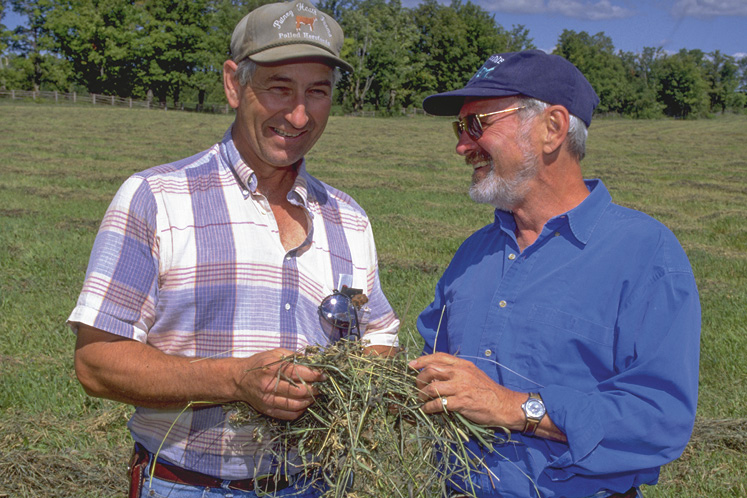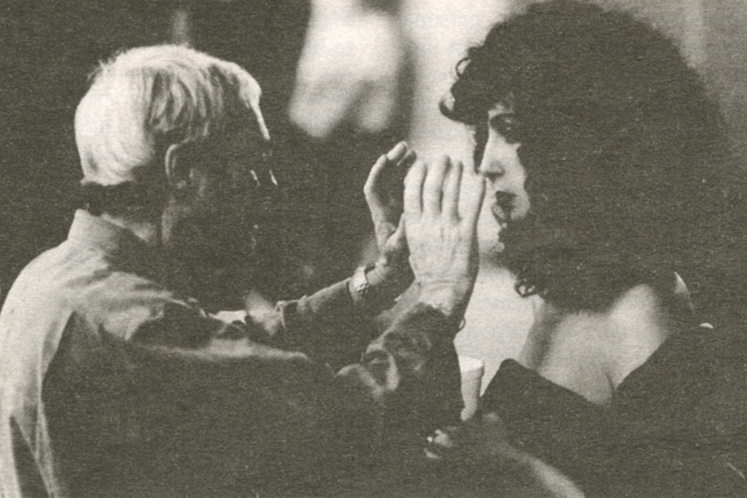Norman Jewison – Filmmaker and Farmer
Norman Jewison, one of the world’s great movie directors, feels most at home when he’s down on the farm.
Norman Jewison’s passport bulged with residence visas and visitor’s documents, and the immigration officer at the Toronto airport on this day in late July 1978 seemed exasperated at the thick pages of stamps and certificates.
“Where do you live?” he asked the traveller.
“I’m going to live in Canada again,” Norman Jewison answered. “I’m a returning settler.”
“Returning from where?” the immigration man pressed him. “What places have you been living?”
“Well, the last eight years in London, England. For eight years more before that, I was in Los Angeles. And the four years at the beginning, after I left Canada, were in New York City.”
“Huh,” the immigration officer said, incredulous. “So why are you coming back here?”
Welcome to Canada.
“Only in my native country would an official in a department of the federal government question my sanity in returning home,” Norman says, remembering the encounter. “An American immigration officer would have asked what took me so long to come home. The Canadian guy thought I was nuts. But I knew I was right.”
Norman Jewison, one of the world’s great movie directors, had become homesick for the country of his birth. He had grown up over his parents’ dry goods store at the corner of Queen Street and Kippendavie Avenue in the Beach section of Toronto. But now, returning to Southern Ontario, he yearned for something rural, a farm. Not too remote, though, since he would still be jetting off to Hollywood and other far-flung spots where movies and movie deals get made. Which explained why he instructed his Toronto real estate friend Myra Koster to find him a country place within a twenty-minute drive of the airport.
“So on a day in January 1978 that was as cold as Siberia, my wife Dixie and I were riding in a limo up the third line of Albion Township,” Norman says. “We were on our way to look at the place Myra had located, one hundred acres or so that a man named John Ellis had farmed for decades. We almost didn’t make it because the limo slid off the icy road. But as soon as Dixie and I walked into the farmhouse up there on the hill, with the glorious southern vista across the countryside, we fell in love with the property. On the way back to the airport in the limo, we timed the drive. Twenty-nine minutes. Close enough.”
Norman wasn’t content to play the gentleman farmer. The place, which he named Putney Heath Farms after the suburb of London that the Jewisons were moving from, would be a working farm. Norman hired a farm manager, Jim Pipher, and together the two men began to fence the property. They built a herd of Polled Herefords, starting with six cows and increasing to more than a hundred head today. Many have developed into prize winners at the Royal Agricultural Winter Fair in Toronto and other shows across the country. The herd has grown so large and special that Norman, needing more land for the Herefords, leases additional fields from four other farms in the area.
It was Jim Pipher’s idea to tap the maple trees at Putney Heath Farms, and that led to another sideline, the Jewison brand of maple syrup. And hay became a big cash crop, a business that employs almost a dozen summer workers and that supplies many of the area’s farmers with feed for their livestock. “A working farm?” Norman asks. “Yeah, but a joy too.”

At the same time, in his professional life, Norman was setting himself an even tougher chore: he would bring his job, movie-making, home to Ontario. Ironically, it had been the search for work in his chosen field that had originally taken him away from home.
He began his career at CBC television in the early 1950s producing and directing everything from a puppet show, Uncle Chichimus, to variety specials. Then CBS lured him to New York to direct network TV shows, starring a dazzling array of brand-name performers, from Danny Kaye and Judy Garland, to Jackie Gleason and Frank Sinatra. These successes caught Hollywood’s attention, and Norman’s film career got under way in 1962 when he directed Tony Curtis in the charming comedy 40 Pounds of Trouble.
He worked his way through three more comedies, two of them featuring Doris Day, before he took on the movie drama that changed his life, The Cincinnati Kid with Steve McQueen.
“It was the first movie that had some of me in it,” Norman explains. “It was the first where I had a measure of control over the script and casting and editing. It was the movie that showed me the possibilities of saying something in a film that had meaning, that could touch people.”
Norman Jewison’s directorial oeuvre today extends to twenty-two feature movies. They have drawn forty-five Academy Award nominations (including three for Norman personally). The movies cover a wide and complex range, from dramas about race (In the Heat of the Night, A Soldier’s Story) to meditations on violence and the future (Rollerball) to romantic comedies (Moonstruck).

Some critics insist that this apparent eclecticism reflects a weakness in his work. But such carping misses the point. All his movies, no matter what the subject, mood or style, explore personal themes and attempt to give them universal accessibility. Betrayal is a favourite and recurring text. Thus, The Thomas Crown Affair, which operates on the surface as a witty, fashionable crime caper, becomes, in Norman Jewison’s hands, a tantalizing play on the chance that two lovers will betray each another. In later movies, the director has offered variations on such other themes dear to him as confrontation and responsibility. His movies are disguised as popular entertainments, but dig a little deeper and they reveal insights with the power to move and surprise their audiences.
Then, in 1978, after the returning settler established his new home in Caledon, the question he asked himself became, could he make his big-theme movies in Canada, away from the industry’s traditional centre in California and London?
Norman’s answer was to pitch in to the task of converting Toronto into a movie headquarters. He founded the Canadian Centre for Advanced Film Studies on the twenty-two-acre Windfields estate in North York. It is an institution where Canadian writers, directors and producers develop and refine their movie-making talents.
And Norman, putting his money where his mouth was, began to shoot at least parts of his films in and around Southern Ontario. While of necessity he still relied on Hollywood for financing and expertise – he maintains an office and a second home in Los Angeles – he made much use of the growing number of movie sound stages in Toronto, and he became ingenious at seeking out locations in and around the city. His 1985 drama, Agnes of God, was largely shot at the Academy in Rockwood, and he filmed much of his 1995 comedy-drama, Bogus, in Toronto parks, streets, homes and back alleys. In these and other films, Norman was showing himself to be both a canny movie-maker and a good Ontario citizen.
Meanwhile, back at the farm, Putney Heath has blossomed into a showplace and a homestead. Dixie Jewison gave the farmhouse a handsome renovation job, and Norman planted the grounds in gorgeous trees, shrubs and flower beds. It became a family centre, a gathering spot for the three adult Jewison children, Kevin (of Paris, France), Michael (Toronto), and Jennifer (London, England), and the four grandchildren. Jessie the donkey was the little kids’ favourite until, alas, she passed on at a great age late this past spring. A new donkey, Jackie, has recently arrived to join Lady the quarter horse and old Sullivan, the once-upon-a-time police horse. For Norman Jewison, Putney Heath offers beauty, peace and a renewed sense of home.
“This is where I’ll be for the rest of my life,” he says. “I love Caledon. Everything I was looking for turned out to be right here.”
Toronto writer Jack Batten is a film critic and author of several books, including Norman Jewison’s autobiography.
More Info
Norman Jewison Director Credits
1962 40 Pounds of Trouble
1963 The Thrill of It All
1964 Send Me No Flowers
1965 The Art of Love
1965 The Cincinnati Kid
1966 The Russians Are Coming The Russians Are Coming
1967 In the Heat of the Night
1968 The Thomas Crown Affair
1969 Gaily, Gaily
1971 Fiddler on the Roof
1973 Jesus Christ Superstar
1975 Rollerball
1978 F.I.S.T.
1979 … And Justice For All
1982 Best Friends
1984 A Soldier’s Story
1985 Agnes of God
1987 Moonstruck
1989 In Country
1991 Other People’s Money
1994 Only You
1996 Bogus









